
Konkani is an Indo-Aryan language spoken by the Konkani people, primarily in the Konkan region, along the western coast of India. It is one of the 22 scheduled languages mentioned in the Indian Constitution, and the official language of the Indian state of Goa. It is also spoken in Karnataka, Maharashtra, Kerala, Gujarat as well as Damaon, Diu & Silvassa.

The Jnanpith Award is the oldest and the highest Indian literary award presented annually by the Bharatiya Jnanpith to an author for their "outstanding contribution towards literature". Instituted in 1961, the award is bestowed only on Indian writers writing in Indian languages included in the Eighth Schedule to the Constitution of India and English, with no posthumous conferral.

Kota Shivaram Karanth, also abbreviated as K. Shivaram Karanth, was an Indian polymath, who was a novelist in Kannada language, playwright and an ecological conservationist. Ramachandra Guha called him the "Rabindranath Tagore of Modern India, who has been one of the finest novelists-activists since independence". He was the third writer to be decorated with the Jnanpith Award for Kannada, the highest literary honor conferred in India. His son Ullas is an ecological conservationist.

Manjeshwar Govinda Pai, also known as Rastrakavi Govinda Pai, was a Kannada poet. He was awarded the first Rashtrakavi title by the Madras Government. Rashtrakavi M. Govinda Pai was the one who put Manjeshwara(now in Kerala) on the literary map of India.
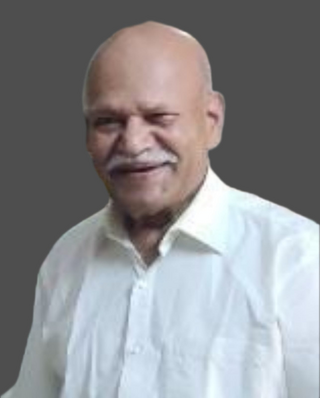
Hampa Nagarajaiah, known by his pen name Hampanā, is an Indian scholar in Kannada language and Jainism. He was born at Hampasandra Village located in Gowribidanur taluk, Chikkaballapura District in the Indian state of Karnataka. Hampanā was married to Kamala Hampana, also a veteran littérateur, until her death.
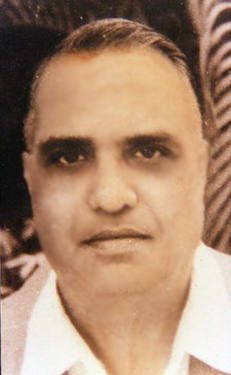
Dinakara Desai was a poet, writer, educationist, and political activist. He was famous for his poetry form called chutuka. Chutuka or chutuku is a quadraplet poem. This format was later adopted by other poets. He made major contributions towards the literary development of the Uttara Kannada district of Karnataka.

Chandrashekhara Basavanneppa Kambara is a prominent Indian poet, playwright, folklorist, film director in Kannada language and the founder-vice-chancellor of Kannada University in Hampi also president of the Sahitya Akademi, country's premier literary institution, after Vinayak Krishna Gokak (1983) and U.R. Ananthamurthy (1993). He is known for effective adaptation of the North Karnataka dialect of the Kannada language in his plays, and poems, in a similar style as in the works of D.R. Bendre.

Jayant Kaikini is a poet, short story writer, playwright, columnist in Kannada and a lyricist in Kannada cinema. He has so far published six anthologies of short stories, four books of poetry, three plays and a collection of essays. He is valued as one of the best writers in Kannada literature and has revolutionized the field by giving it a fresh new perspective. He has bagged many notable awards like 'Karnataka Sahitya Academy' award, Kusumagraj Award, Katha Award, DSC Prize for South Asian Literature amidst others. Kaikini is regarded as one of the most significant writers in Kannada today. Kaikini has been conferred the honorary doctorate from Tumkur University.

Mysore Venkatadasappa Seetharamiah or M. V. See was an Indian Kannada language author, editor and translator. Through a career spanning over sixty years, he published over 100 works spanning short stories, poetry, novels, and dramas. Some of his notable works included Sri Vijaya kruta Kavirajamarga, a retelling of the classical Kavirajamarga, Udayadityalankara, a work on Kannada poetics, and also other works on ancient Kannada language grammar.
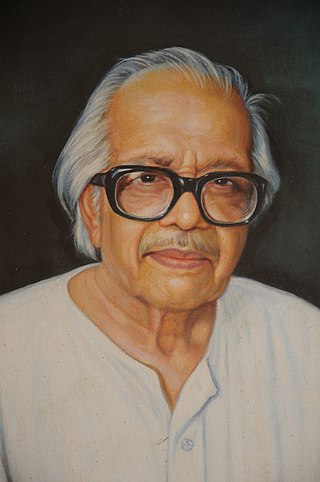
Ravindra Kelekar was a noted Indian author who wrote primarily in the Konkani language, though he also wrote in Marathi and Hindi. A Gandhian activist, freedom fighter and a pioneer in the modern Konkani movement, he was a well known Konkani scholar, linguist, and creative thinker. Kelekar was a participant in the Indian freedom movement, Goa's liberation movement, and later the campaign against the merger of the newly formed Goa with Maharashtra. He played a key role in the founding of the Konkani Bhasha Mandal, which lead the literary campaign for the recognition of Konkani as a full-fledged language, and its reinstatement as the state language of Goa. He authored nearly 100 books in the Konkani language, including Amchi Bhas Konkaneech, Shalent Konkani Kityak, Bahu-bhashik Bharatant Bhashenche Samajshastra and Himalayant, and also edited Jaag magazine for more than two decades.
The Pampa Award is a literary award in the Indian state of Karnataka. The award was established in 1987 by the government of Karnataka. It is the highest literary honor conferred by the Department of Kannada and Culture, Government of Karnataka State, and recognises works written in the Kannada language.
Vincent John Peter Saldanha was an Indian Konkani language littérateur, dramatist, novelist, short-story writer and poet. He made significant contributions to Konkani literature as a poet, dramatist, novelist, and a litterateur.

Janaki Srinivasa Murthy popularly known by her penname Vaidehi was born on 12 February 1945. She is an Indian feminist writer and well-known writer of modern Kannada language fiction. Vaidehi is one of the most successful women writers in the language and a recipient of prestigious national and state-level literary awards. She has won the Sahitya Akademi Award for her collection of short stories, Krauncha Pakshigalu in 2009.

Basti Vaman Madhav Shenoy was an Indian Konkani activist, popularly known as "Vishwa Konkani Sardar" and was the founder of World Konkani Centre in Shakthinagar, Mangalore.
John Baptist Moraes was a Konkani poet and writer. He was based in Bombay (Mumbai), which he migrated to in 1951 and wrote in Konkani in the Kannada script. He was also the founder and co-editor of the Konkani Daiz monthly, he was on the editorial board of the Poinnari weekly, and in 2002 was appointed member of the General Council of the Sahitya Akademi, India's academy of letters.
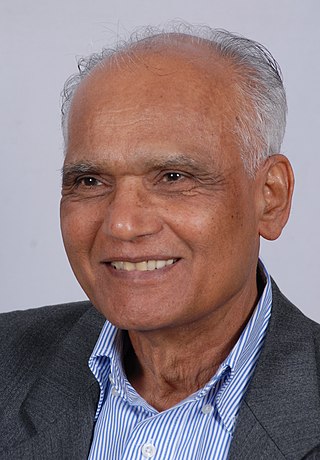
Santeshivara Lingannaiah Bhyrappa is an Indian novelist, philosopher and screenwriter who writes in Kannada. His work is popular in the state of Karnataka and he is widely regarded as one of modern India's popular novelists. His novels are unique in terms of theme, structure, and characterization. He has been among the top-selling authors in the Kannada language and his books have been translated into Hindi and Marathi which have also been bestsellers.

Sumathendra Raghavendra Nadig was an Indian professor and writer in Kannada. Nadig came upon the literary scene as a prominent modern poet in the 1960s. He was a close associate of Gopalakrishna Adiga, the leader of the modernist movement.
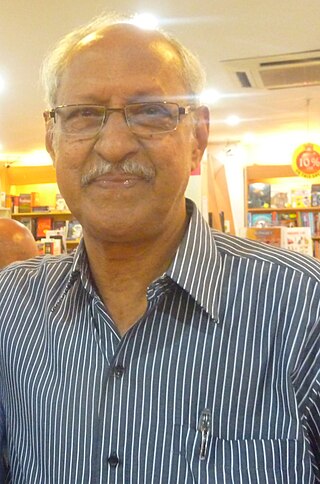
Damodar Mauzo is an Indian short story writer, novelist, critic, and screenwriter in Konkani. He was awarded the 57th Jnanpith Award, India's highest literary honour, in 2022, Sahitya Akademi Award in 1983 for his novel Karmelin and the Vimala V. Pai Vishwa Konkani Sahitya Puraskar award for his novel Tsunami Simon in 2011. His collection of short stories Teresa's Man and Other Stories from Goa was nominated for the Frank O'Connor International award in 2015. He has served as a member of the executive board, general council, as well as the finance committee of the Sahitya Akademi.

Konkani literature is literature in the Konkani language, mostly produced in three scripts: Roman, Devanagari and Kannada. Konkani literature is eligible for the Sahitya Akademi Award.
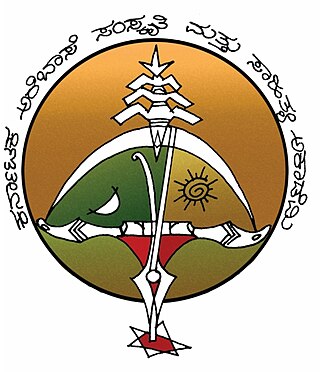
Karnataka Arebhashe Samskruthi mathu Sahitya Academy is an organization under Government of Karnataka for promotion of literature in Arebhashe language. Established on 15 December 2011 by the Government of Karnataka. The purpose of the academy is to preserve and promote the Arebhashe language, Arebhashe literature, and Arebhashe culture. Which has a considerable population of Arebhashe speakers, a language minority in the state Karnataka and Kerala. Arebhashe is a dialect of Kannada spoken mainly by Gowda and other community in the region of Kodagu, Sullia of Dakshina Kannada in the Indian state of Karnataka as well as Bandadka, Kasaragod District in the Indian state of Kerala. The academy was formed by then Chief Minister D. V. Sadananda Gowda.
















